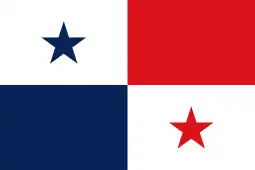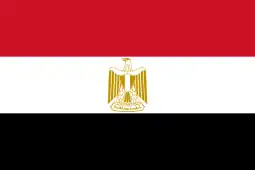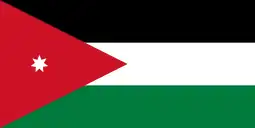Nicos Anastasiades
Nicos Anastasiades (Greek: Νίκος Αναστασιάδης [ˈnikos anastasiˈaðis];[1][2] born 27 September 1946) is a Cypriot politician, who served as the seventh president of Cyprus from 2013 to 2023. Previously, he was the leader of Democratic Rally between 1997 and 2013 and served as Member of Parliament from Limassol between 1981 and 2013.[3]
Nicos Anastasiades | |
|---|---|
| Νίκος Αναστασιάδης | |
.jpeg.webp) Anastasiades in 2022 | |
| 7th President of Cyprus | |
| In office 28 February 2013 – 28 February 2023 | |
| Preceded by | Demetris Christofias |
| Succeeded by | Nikos Christodoulides |
| President of the Democratic Rally | |
| In office 8 June 1997 – 10 May 2013 | |
| Preceded by | Yiannakis Matsis |
| Succeeded by | Averof Neofytou |
| Member of the Cypriot House of Representatives | |
| In office 4 June 1981 – 27 February 2013 | |
| Constituency | Limassol |
| Personal details | |
| Born | 27 September 1946 Pera Pedi, Limassol District, Cyprus |
| Political party | Democratic Rally (1976–present) Centre Union (before 1977) |
| Spouse |
Andri Moustakoudi (m. 1971) |
| Children | 2 |
| Alma mater | University of Athens University of London |
| Signature |  |
| ||
|---|---|---|
1981 Cypriot legislative election 1985 Cypriot legislative election 1991 Cypriot legislative election 1996 Cypriot legislative election 2001 Cypriot legislative election 2006 Cypriot legislative election 2011 Cypriot legislative election 2013 Cypriot presidential election 2018 Cypriot presidential election |
||
First elected in the 2013 presidential election, he was re-elected in 2018. As President, he oversaw an economic recovery, largely due to an increase in foreign investment, which raised standards of living on the island. However, he cut public spending. Between 2015 and 2017, he advanced the reunification process to its furthest stage in over a decade, but ultimately an agreement could not be reached.
Education
Anastasiades is a lawyer by profession, and the founder of law firm "Nicos Chr. Anastasiades & Partners".[4] He graduated in law from the National and Kapodistrian University of Athens and completed postgraduate studies in shipping law at the University of London. During his university studies, he was a member of the Centre Coalition based in Athens formed by Georgios Papandreou.[5]
Early political career
Anastasiades was first elected to the House of Representatives in 1981 with the Democratic Rally and remained an MP until 2013, when he resigned in order to assume his duties as President of the Cyprus. He was the leader of his party from 1997 to 2013.[6]
Presidency
Elections
.jpg.webp)
In March 2012, Nicos Anastasiades was nominated as a candidate for the 2013 presidential election, against his rival MEP Eleni Theocharous in a vote among the 1,008 strong executive of the Democratic Rally.[7] Nicos Anastasiades received 673 votes (86.73%) and Theocharous received 103 (13.27%). In the first round of the presidential election on 17 February 2013, Anastasiades won 45% of votes, while Stavros Malas and George Lillikas earned 26.9% and 24.9%, respectively.[8] He won in the second round against Malas with 57.48% of the vote and was sworn in as president on 28 February 2013.
In a repeat of the previous election, he once again beat Malas in 2018.
Public spending
He pledged to implement the Structural Reforms demanded by the European Commission in order to obtain economic aid and cut social benefits, pensions and wages in the public and private sectors, while increasing VAT and fuel taxes. He also decided to reduce the number of civil servants.[9][10]
Banking bail-out
Anastasiades had to break campaign promises by agreeing to let the banks confiscate 47.5 percent of bank accounts over 100,000 euros in 2013, in order to acquire a 10-billion euro bailout from international lenders.[11]
Speaking before a committee of inquiry into the island's economic collapse, Anastasiades conceded he reneged on his pledges not to accept a "haircut" on deposits, stressing that the alternative would have been catastrophic for Cyprus.[12]
He later came to comment that Cyprus was treated as a guinea pig with extreme measures never applied before, but despite his counter-proposals they were all blatantly rejected during the Eurogroup meeting.[13] However, such claims were heavily criticized on the press for being misleading, citing references from Eurogroup's members who stated that the bailout plan was actually Anastasiades's proposal.[12] Additional criticism was due to claims that the president himself warned his associates and friends to move money abroad before financial crisis hit.[14]
Despite the heavy criticism, the government's effective management of capital controls, however, revived the country's banking system, and Cyprus was able to exit the bailout in 2016.[15]
Transition from conscription to a professional military
.jpg.webp)
.jpg.webp)
During his electoral campaign for the post of Cyprus President in 2013, he announced his commitment to reduce military conscription in Cyprus to 14 months during the first hundred days of his term.[16] During the early months of the Anastasiades administration there was important planning for the reduction of military conscription to 14 months in order to increase the incentive for 18 year olds to serve their conscription and to reduce the financial burden to the Cypriot state. Minister of Defence Fotis Fotiou announced that there would be a final decision on the reduction of military conscription towards late 2013. There was increasing pressure for ending military conscription due to the 2012–13 Cypriot financial crisis.
In early August 2013, Minister of Defence Fotis Fotiou announced the reduction of military service, which was in the electoral manifesto of Anastasiades. He supported that national service will be reduced to 18 months in the first phase and decrease further to 14 months before the end of 2014. On 25 February 2016, it was decided by the cabinet to reduce the military service to 18 months for all conscripts who joined in the summer of 2015, and to reduce the service to 14 months for all those who joined thereafter.[17]
As part of these proposals to professionalise the National Guard, President Anastasiades introduced the contracted soldiers "Συμβασιούχοι Οπλίτες (ΣΥΟΠ)" whose role is to mainly cover the operational needs of the National Guard now that the military service was reduced to up to 14 months, an initiative which has been considered to be successful.[18]
Cyprus Problem
.jpg.webp)
.jpeg.webp)
Anastasiades supported the Annan Plan, even though a majority (61%) of his party voted it down. Some of his intra-party opposition even called for Anastasiades to step down.[19] Many party cadres were up in arms over Anastasiades' letter to the European Parliament alleging that the government trampled on free speech and human rights during the referendum's "Yes" campaign. The government cited the National Television Council's data that showed that the six parties supporting the "No" vote got as much air time as the two that supported the UN plan.[20] The start of peace negotiations between Nicos Anastasiades and his Turkish Cypriot counterpart began in October 2013, attracting the interest of international media and world leaders including Barack Obama.[21]
In October 2022, Anastasiades condemned the European Union's "double standards" and "tolerance" toward Turkey, arguing that "Interests cannot take precedence over principles and values. We cannot say that we are currently making sacrifices to help Ukraine – and rightly so – to cope with the illegal invasion and violation of its territorial integrity and, at the same time, we put our interests first in our relations with Turkey."[22]
Controversies
On 3 November 2019, newspapers reported that under Anastasiades' government, controversial Malaysian figure Jho Low had been granted Cypriot citizenship.[23] It was reported that Jho Low obtained the passport under the Cypriot citizenship investment scheme just two days after investing in Cypriot property.There was no warrant against Jho Low for the 1MDB scandal; however, he was already under investigation and investigators were closing in on him for his alleged money laundering activities.[24] He was granted the passport despite the fact that a background check on him raised several red flags because of his status as a politically exposed person, as well as his alleged fraud and regulatory breaches.[24] It was also revealed that while the golden passport scheme normally requires applicants to live in the country for at least seven years, as well as buy property, the decision to override this requirement was taken by the country's cabinet. However, the such exemptions are frequently granted.[25] The revelation concerning Jho Low's Cypriot citizenship came after the Cypriot citizenship investment scheme, implemented by Anastasiades's cabinet to increase foreign investment, came under scrutiny. This was due to the decision to grant citizenship to Cambodian elites.[26][27]
In August 2019, an OCCRP report linked President Anastasiades' Law firm, which he co-owned and from which he stepped away just as he was ascending to the presidency in 2013, with "business deals linked to a friend of Russian President Vladimir Putin, the infamous Magnitsky scandal, and a network of companies used in various financial crimes."[28] Both of President Anastasiades' daughters are still partners in the firm, and he still has a private office in the building. The report revealed that Anastasiades' Law firm "executed complex deals that moved Russian money to and from shell companies created by and associated with the firm", two of which appear to be deeply entwined with the Troika Laundromat.[28] [29] The accusations were never proven.
In October 2021, his name was mentioned in the infamous Pandora papers. [30]
Personal and family life
Nicos Anastasiades was born on in the village of Pera Pedi on 27 September 1946 to a Greek Cypriot family. He married Andri Moustakoudi in 1971 and they have two daughters.[5] He has a twin brother and a sister.[31]
In 2001, his twin brother, Pambos Anastasiades, was sentenced to 18 months in prison for his role in a work permit scandal, which was related to forging "pink visas", i.e. work permits for foreign women employed in illegal brothels.[32]
Distinctions
.jpg.webp)
- First Vice-president of the delegation of the House to the EU-Cyprus Joint Parliamentary Committee (JPC).
- Leader of the delegation of the House to the Association of Asian Parliaments for Peace (Asian Parliamentary Assembly (APA) since 2008).
- Leader of the delegation of the House to the Parliamentary Assembly of the Mediterranean (PAM).
- Leader of the delegation of the House to the Euro-Mediterranean Parliamentary Assembly (EMPA) (Parliamentary Assembly of the Union for the Mediterranean since 2010).[33]
- Leader of the delegation of the House to the Euro-Mediterranean Parliamentary Assembly (EMPA) (Parliamentary Assembly of the Union for the Mediterranean since 2010).
- Vice-president of the executive committee of the Cyprus Group to the Inter-Parliamentary Union (IPU).
- Member of the delegation of the House to the Parliamentary Assembly of the Union for the Mediterranean and of the delegation of the House to the Asian Parliamentary Assembly (APA).[33]
Honours and awards
- Greek Orthodox Patriarchate of Jerusalem: Knight Grand Cross of the Order of the Orthodox Crusaders of the Holy Sepulchre (7 May 2013)[34]
 Panama: Collar of the Order of Manuel Amador Guerrero (23 July 2013)[35]
Panama: Collar of the Order of Manuel Amador Guerrero (23 July 2013)[35] Bahrain: Order of Sheikh Isa bin Salman Al Khalifa (9 March 2015)[36]
Bahrain: Order of Sheikh Isa bin Salman Al Khalifa (9 March 2015)[36] Greece: Grand Collar of the Order of the Redeemer (30 March 2015)[37]
Greece: Grand Collar of the Order of the Redeemer (30 March 2015)[37] Egypt: Grand Collar of the Order of the Nile (20 November 2017)[38]
Egypt: Grand Collar of the Order of the Nile (20 November 2017)[38]- Greek Orthodox Patriarchate of Alexandria: Knight Grand Cross of the Order of Saint Mark (1 May 2018)[39]
 Serbia: Grand Cross of the Order of the Republic of Serbia (10 May 2018)[40]
Serbia: Grand Cross of the Order of the Republic of Serbia (10 May 2018)[40]- Serbian Orthodox Church: Order of St. Sava (10 May 2018)[41]
 Slovenia: Order for Exceptional Merits (9 January 2019)[42]
Slovenia: Order for Exceptional Merits (9 January 2019)[42] Poland: Grand Cross of the Order of the White Eagle (4 October 2021)[43]
Poland: Grand Cross of the Order of the White Eagle (4 October 2021)[43] Georgia: Order of the Golden Fleece (9 November 2021)[44]
Georgia: Order of the Golden Fleece (9 November 2021)[44] Jordan: Grand Cordon of the Supreme Order of the Renaissance (17 December 2021)[45]
Jordan: Grand Cordon of the Supreme Order of the Renaissance (17 December 2021)[45].svg.png.webp) Holy See: Grand Collar of the Order of Pope Pius IX (25 October 2022)[46]
Holy See: Grand Collar of the Order of Pope Pius IX (25 October 2022)[46] Israel: President's Medal (10 November 2022)[47]
Israel: President's Medal (10 November 2022)[47]
References
- ULUSOY, Kıvanç (2015). Doğu Akdeniz'de Güç Mücadelesi ve Kıbrıs Sorunu (in Turkish). International Strategic Research Organization (USAK). ISBN 9786054030989.
- "Sayarı: "Anastasiadis solun adayı Malas karşısında yarışın favorisi görülüyor"". KIBRIS POSTASI. Retrieved 4 February 2018.
- "Βιογραφικό | Προεδρία της Κυπριακής Δημοκρατίας".
- "Anastasiades & Partners". Cyprus Law. Archived from the original on 12 October 2012. Retrieved 25 February 2013.
- "Index". Anastasiades. Archived from the original on 3 March 2013. Retrieved 25 February 2013.
- "Nicos Anastasiades". Economist Conferences, CEMEA. Archived from the original on 6 April 2013. Retrieved 25 February 2013.
- "Disy picks Nicos, Nicos Anastasiades, Disy, Eleni Theocharous". ISG. 19 March 2012. Retrieved 25 February 2013.
- "Nicos Anastasiades winner of first round of elections in Cyprus". Nasdaq. Retrieved 25 February 2013.
- "A Chypre, les mesures d'austérité dépassent les demandes de la Troïka". 14 October 2013.
- "The Troika's Policy in Greece: Rob the Greek people and give the money to private banks, the ECB, the IMF and the dominant States of the Eurozone". 20 May 2022.
- "Bailed-Out Cyprus Banks Feel Good Now, Depositors Don't". The National Herald. 3 July 2016. Retrieved 16 April 2017.
- "Deposit haircut was Eurogroup's proposal: Anastasiades (Updated)". Cyprus Mail. 27 August 2013. Retrieved 22 April 2019.
- "Greek Cyprus a 'guinea pig' for EU haircut experiment: President – Latest News". Hürriyet Daily News. Retrieved 22 April 2019.
- Lendman, Stephen (2 April 2013). "Scandal Hits Cyprus". Stephen Lendman. Retrieved 22 April 2019.
- "Nicos Anastasiades | Biography & Facts". Encyclopedia Britannica. Retrieved 22 April 2019.
- "Δέσμευση Αναστασιάδη για μείωση της στρατιωτικής θητείας μειωση, στρατιωτες, δεσμευση, θητειας". Axortagos. 23 January 2013. Archived from the original on 12 April 2013. Retrieved 25 February 2013.
- "Government cuts army service". Cyprus Mail. Retrieved 4 April 2016.
- "Συμβασιούχοι Οπλίτες (ΣΥΟΠ)". army.gov.cy (in Greek).
- Ministry of Interior
- George Gilson (30 April 2004). "'No' shakes Cyprus party politics". Athens News. Archived from the original on 17 February 2013. Retrieved 25 February 2013.
- "Great opportunity to resolve Cyprus problem: Obama". Cyprus Mail. 9 August 2013. Retrieved 16 October 2014.
- "The EU's 'tolerance' and 'double standards' with Turkey embolden Erdoğan, claims Cyprus President". Euronews. 11 October 2022.
- "Malaysian fugitive financier holds Cyprus passport – report". Cyprus Mail. 3 November 2019. Retrieved 4 November 2019.
- "Jho Low obtained Cypriot passport after authorities closed in – report". Malaysiakini. 3 November 2019. Retrieved 4 November 2019.
- "Cyprus defends 'golden passport' scheme after Jho Low link". Financial Times. 4 November 2019. Retrieved 5 November 2019.
- "Cyprus to probe how Cambodian elite obtained EU passports". Reuters. 23 October 2019. Retrieved 4 November 2019.
- Dalby, Chris (21 October 2019). "Money Laundering May Have Fueled Luxury US Lifestyle of Hugo Chavez's Daughter". InSight Crime. Retrieved 8 November 2019.
- IRPI, OCCRP and. "Bank Records Link President of Cyprus to 'Troika Laundromat'". OCCRP. Retrieved 30 August 2019.
- "Τον πρόεδρο Αναστασιάδη αγγίζουν τα "χρυσά" διαβατήρια". 19 October 2020.
- "Czech, Cypriot leaders named in massive offshore data leak". 3 October 2021.
- "Presidency of the Republic of Cyprus – Curriculum Vitae". Archived from the original on 5 April 2013. Retrieved 9 April 2013.
- "Cyprus Broadcasting Corporation: News in English, 01-06-19". hri.org. Retrieved 26 April 2019.
- "Anastasiades Chr. Nicos". Parliament. Retrieved 25 February 2013.
- "Τον ευλόγησε ο Πατριάρχης Ιεροσολύμων".
- "Παρασημοφόρηση του Προέδρου της Δημοκρατίας από τον Παναμά". Kathimerini.com.cy. Η Καθημερινή. 23 July 2013. Archived from the original on 16 July 2019. Retrieved 16 July 2019.
- "Ο Πρόεδρος της Δημοκρατίας έτυχε επίσημης υποδοχής από το Βασιλιά του Μπαχρέιν". Γραφείο Τύπου και Πληροφοριών. 9 March 2015. Archived from the original on 16 July 2019. Retrieved 16 July 2019.
- "Παράσημα και τη "ψυχή μας" έδωσε ο ΠτΔ στον Παυλόπουλο". www.sigmalive.com. 30 March 2015. Archived from the original on 16 July 2019. Retrieved 16 July 2019.
- Andreou, Evie (20 November 2017). "Security, energy, migration the focus of Sisi visit (Update 5)". Cyprus Mail. Archived from the original on 16 July 2019. Retrieved 16 July 2019.
- "Με τον Μεγαλόσταυρο του Αγίου Μάρκου τιμήθηκε ο Πρόεδρος Αναστασιάδης". Kathimerini.com.cy. Η Καθημερινή. 1 May 2018. Archived from the original on 16 July 2019. Retrieved 16 July 2019.
- "ΠτΔ: Στην Κύπρο η 2η Διακυβερνητική Κύπρου - Σερβίας". Philenews. Ο Φιλελεύθερος. 10 May 2018. Archived from the original on 16 July 2019. Retrieved 16 July 2019.
- "Ο Πρόεδρος παρασημοφορήθηκε από τον Πατριάρχη Σερβίας". Kathimerini.com.cy. Η Καθημερινή. 10 May 2018. Archived from the original on 16 July 2019. Retrieved 16 July 2019.
- "Anastasiades Receives Award by Slovenian President".
- "Internetowa baza tekstów prawnych OpenLEX". OpenLEX. Retrieved 11 March 2023.
- Abdaladze, Giorgi (9 November 2021). "English: The Order of the Golden Fleece presented to President Nicos Anastasiades of Cyprus by President Salome Zourabichvili". Retrieved 11 March 2023 – via Wikimedia Commons.
- "Anastasiades welcomed King of Jordan (Update 1) | Cyprus Mail".
- "President Anastasiades receives highest honorary distinction of the Holy See".
- "Anastasiades honoured by Israel". Financial Mirror. 10 November 2022. Retrieved 10 November 2022.
External links
 Media related to Nicos Anastasiades at Wikimedia Commons
Media related to Nicos Anastasiades at Wikimedia Commons Quotations related to Nicos Anastasiades at Wikiquote
Quotations related to Nicos Anastasiades at Wikiquote
_(cropped).jpg.webp)